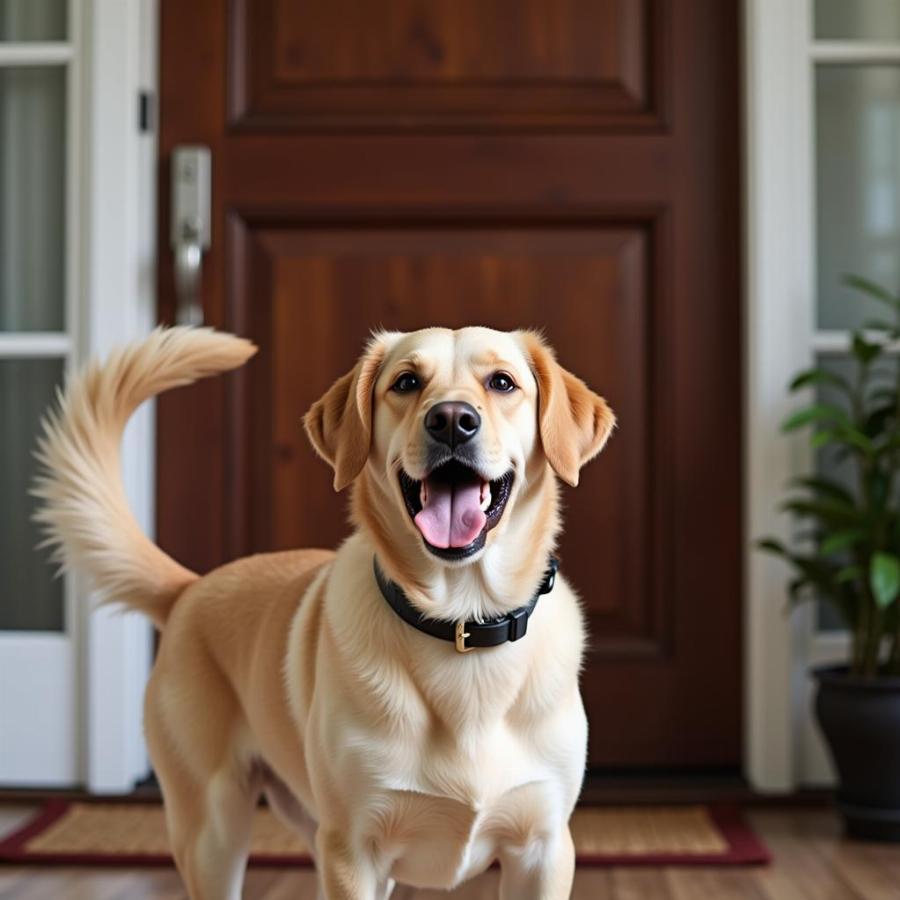Protecting their home is a natural instinct for dogs, but excessive house guarding can become problematic. This behavior, often manifested as barking, growling, or even lunging at visitors or passersby, can stem from various reasons, including territoriality, fear, or anxiety. Understanding why your dog is guarding the house is the first step towards effectively addressing and modifying this behavior. In this article, we’ll explore the underlying causes of house guarding and provide practical, step-by-step guidance on how to stop your dog from guarding the house and create a calmer, more welcoming environment for everyone.
Understanding Why Your Dog Guards the House
Several factors can contribute to a dog’s house-guarding behavior. Is your dog a certain breed known for protective instincts? Perhaps they’ve had a negative experience in the past that has made them wary of strangers. It’s also possible that your dog is simply exhibiting territorial behavior, a natural canine instinct. Sometimes, underlying anxiety or fear can trigger house guarding. Identifying the root cause is crucial for developing an effective training strategy. Is it territoriality, fear-based, or perhaps a learned behavior? Figuring this out will help you tailor your approach.
Effective Techniques to Stop House Guarding
Addressing house guarding requires patience, consistency, and a positive approach. Punishment is never the answer and can often exacerbate the problem. Instead, focus on positive reinforcement and desensitization techniques.
Desensitization and Counter-Conditioning
This involves gradually exposing your dog to the triggers that cause their guarding behavior, such as the doorbell or the sight of strangers approaching the house, while simultaneously pairing these triggers with positive experiences, like treats or praise. Start with low-intensity triggers and gradually increase the intensity as your dog becomes more comfortable.
Training Basic Obedience Commands
A well-trained dog is more likely to respond to your commands, even in situations that might trigger their guarding instincts. Focus on commands like “sit,” “stay,” “down,” and “come.” These commands can help you redirect your dog’s attention and regain control in challenging situations.
Managing the Environment
Creating a safe and comfortable environment for your dog can also help reduce their anxiety and guarding behavior. This might involve providing a designated safe space where your dog can retreat when they feel overwhelmed, limiting their access to windows and doors where they can see potential triggers, or using white noise machines to mask outside noises.
Why Does My Dog Bark Excessively When Guarding?
Excessive barking is a common component of house guarding. Your dog is using their bark as an alarm signal to warn off perceived threats. Understanding the underlying cause of the barking, whether it’s fear, territoriality, or excitement, can help you address the issue more effectively.
Addressing Excessive Barking
Just like with house guarding, positive reinforcement and desensitization techniques are key to managing excessive barking. Reward your dog when they remain quiet in the presence of triggers and gradually increase the duration of their silence before rewarding them.
 Dog Barking at Doorbell
Dog Barking at Doorbell
When to Seek Professional Help
If your dog’s house guarding is severe or you’re struggling to make progress on your own, it’s important to seek professional help. A certified dog trainer or behaviorist can assess your dog’s behavior, identify the underlying causes, and develop a personalized training plan.
Conclusion
Stopping your dog from guarding the house requires a patient and understanding approach. By identifying the root cause of the behavior and implementing positive reinforcement techniques, you can help your dog feel more secure and less inclined to guard their territory. Remember, consistency is key, and with time and effort, you can create a more welcoming environment for both your dog and your guests. Addressing how to stop your dog from guarding the house creates a safer and more relaxed atmosphere for everyone.
FAQ
- Is house guarding always a problem? Not necessarily. Some level of alertness is normal. However, excessive guarding that involves aggression or extreme anxiety needs to be addressed.
- Can I punish my dog for guarding the house? No. Punishment is likely to worsen the behavior. Focus on positive reinforcement instead.
- How long does it take to stop house guarding? It depends on the dog and the severity of the behavior. It can take weeks or even months of consistent training.
- What if my dog is guarding out of fear? Focus on building their confidence and desensitizing them to the things that frighten them.
- Should I get professional help? If the behavior is severe or you’re not making progress, consulting a professional is a good idea.
- Can medication help with house guarding? In some cases, medication might be recommended in conjunction with behavioral modification. Consult with your veterinarian.
- How can I prevent house guarding in puppies? Early socialization and positive reinforcement training are crucial for preventing house guarding.
Explore More Dog Behavior Tips
For more helpful information about dog behavior, check out these articles: three dog night one is the loneliest number lyrics, why does my dog sit on me, and why does my dog hide his treats. You might also find mountain hound dog and why does my dog sit on my other dog insightful.
Beaut Dogs is your trusted source for all things dog-related. We provide expert advice and resources to help you understand and care for your canine companion. From breed information to training tips, we’re here to support you every step of the way. When you need support, please contact us via Email: [email protected] to get detailed and accurate answers from Beaut Dogs. Visit us at https://beautdogs.com today!